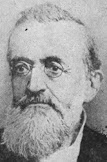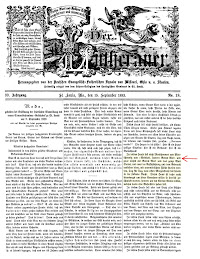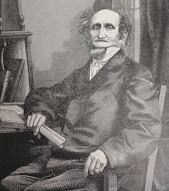(Sent in by Pastor Fick.)
The Seven Words of Christ on the Cross.
Part 1: Der Lutheraner, v. 28, p. 81, March 1, 1872First and second words.
When the Lord carried his cross to the place Golgotha, And now was struck on it: What agony he felt there! When the iron of torture passed through his feet and hands, And he hung suffering without end between two murderers.
Should not his enemies, who crucified the Son of God, For their blasphemy, for their mockery deserve Hell as the reward of their atrocities? But the Savior now pleads, "Alas! forgive, O Father, them. Who know not what they do."
You pleaded with many tears even for me on the cross. Sacrificed with hot longing for us sinners thy prayer, That the Father may forgive us;
Therefore grant me thy mercy, That through thee I may live forever Pure from all sin's guilt.
How full of the flame of love His mother's need felt!
Who stood by the trunk of his cross With a torn heart: for ere she had sorrow lamented her sorrow to him. In his heart he had already thought to care for her.
Has looked upon her comfortingly. Speaks to her with faithful tone, When he sees John standing: "Behold, woman, this is your son!" And to the disciple: "This is your mother!" who on this word now took Mary as his Mother into his house immediately.
Lord, before your departure you honored your mother faithfully, and in your great suffering you gave her a gift: Thou wilt also mildly give daily shelter and bread to mine; Let me also in thy image be the support of my parents.
Part 2: March 15, 1872
Third to seventh words.
One of the murderers said: "Are you Christ, help yourself!" in mockery; When the other asked punishingly: "Are you not afraid of God? We must now receive the guilty punishment for the murder; But this one has never transgressed with a single word."
Then he asked the Lord: "Lord, remember me too. When thou art entered into thy kingdom." And the Lord graciously said, "Truly, you will be with me this very day in Paradise!" Took him as the first spoil of victory into His heaven.
Jesus, who gave paradise to this thief for nothing, when the sinful criminal also called you his master; you invited all: He that believeth shall be saved. Not by works, no! by grace, - JEsu! ah, remember me.
When the Jews and the Gentiles all scorned Christ. And to his great suffering added mockery's torment, Creation deeply felt its Creator's bitter chastisement: Suddenly at noon the sun's bright glow vanished.
Black eclipses lay mourning over sea and land, To lament the sufferings. Which God's Son felt: Sufferings from hell, not to be grasped, That he cried, "My God, my God! Why hast thou forsaken me?" O of the deep distress of soul!
JEsu! ah, now you sank in the midst of the deepest torment: you suffered for all the bitter woe of damnation, all the eternal torments of death, the anguish of hell and the judgment of wrath, to pay for our guilt: - JEsu! ah, do not leave me.
For three hours darkness shrouded the land. When the sun again filled this world with its light. Since the Lord on the cross now knew. That according to God's Word all that had to be done had been accomplished: "I thirst!" he cried.
All strength is gone from him At the bitter wood of torture, When His heart, like wax, melted in the anguish of death. Alas! wounded and bruised, His holy blood flows away, And He, exhausted by plagues, feels the hot glow of "thirst.
God's Lamb! who can fathom thy suffering's great host?
Who, because of our sins, have now submerged you like a sea. — Ah! thy holy body endures all the torment and agony, Which my sinful flesh is guilty of: Therefore, O Lord, have mercy on me!
No one refreshes the Prince of Life, When He bears witness to His torment: Vinegar is given to Him in His thirst Under mockery. When the Lord took of it. Said He, "It is finished!" Saying thus, it is come Now the goal of the night of suffering.
Yes, with joy you have accomplished your Father's will there; Yes, thou hast accomplished thy suffering And the seer's holy word; Yes, accomplished is the payment For the sins of all the world; Yea, the redemption is accomplished Through thy dear ransom.
Lamb of God, you gave yourself for us on the altar of the cross; Offering for us with thy life A perfect sacrifice.
Yes! with one sacrifice you made us eternally righteous. Since thou didst offer thyself as a sacrifice For the human race.
Behold now, O my soul, how the Lord passed death. Crying, "Father, I commit My spirit into Thy hand."
And the noble victory testifies His call's mighty sound; Softly thereupon, the head bowed. Thus peacefully dies God's Son.
And at the same moment there is a roar through the temple house: and the curtain is torn in pieces from top to bottom, indicating that Christ has now entered the eternal sanctuary to receive praise and glory from the Father.
Thundering the wide earth trembles, As in deepest sorrowful wrath: So with grieving gesture it raises its voice of lamentation.
Behold! even the rocks wail, And tear and break; And the chambers of many saints are opened, who are first-begotten.
When the nations see this, that he raises such a cry, All the signs that happen, that the earth trembles with thunder: The warrior band trembles and trembles at the mighty death of the Lord, And deeply shaken confess: This is truly God!
Christ, thou Lamb of God, when my heart breaks in death, graciously bend to me and show me thy friendly face; Show me thy love-fire, How thou didst die for my guilt, And take my spirit, thou faithful God, To thee full of everlasting grace.
- - - - - - - - - - - - - - - - - - - - - - - -Would that some some talented Lutheran, such as Pastor Joel Baseley or Matthew Carver would take Fick's original German and produce it in rhyming verse in English for devotional purposes. But one may still enjoy Fick's poem even without this, as I certainly did.














